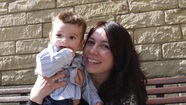I first thought about starting a translation career while I was at secondary school. I grew up as a bilingual child, speaking both Dutch and Spanish, and was always interested in languages. However, when it came to making a decision after finishing school, I decided that a linguistic career was not quite for me; instead choosing a career in medicine. This then developed into a career in pharmacy, an area I had always found fascinating. While I was studying for my pharmacy degree - which I completed at the “Universidad Miguel Hernández from Alicante” - I was required to read and do a lot of research into English written texts (e.g. clinical trials) as the pharmacy industry is continuously developing and new drugs come onto the market every day. This is when I realised that I could actually develop my pharmaceutical profession into a translation career.
Following my pharmacy degree, I decided to move to the UK both to improve my English skills and to develop my professional career as a qualified pharmacist registered with the professional and regulatory body for pharmacists in the UK. After a few years of building up experience in pharmacy and improving my language skills, I enrolled onto the MA in Applied Translation Studies at the University of Leeds, which I completed at the end of 2009.
Following my studies I had originally intended to start working at a company to be able to build up some experience, these plans however changed when I found out I was expecting a baby. This then steered me in the direction of freelancing within the field of medical translation, combining both my academic studies.
Freelancing gives me the opportunity to be able to work from home, which is ideal when you have a baby - although it is sometimes difficult to predict how a day is going to turn out! Like babies, translations can be very “unpredictable”: can you imagine combining the two? Having said that, it also has its plus points: freelancing fits around my family life perfectly. It’s true that when I have tight deadlines I sometimes have to work weekends and late into the evening, but having this flexibility means I am able to predict in advance how many jobs I can take on.
Based on my academic background, a career in medical translation was the obvious choice for me, and I think it’s really important to have an area to focus on. My clients are translation companies which require Spanish translations of clinical trials, drug licenses, patient information leaflets, or other health-related texts that require translating from English or Dutch. Recently, for example, I’ve done a few jobs translating patient histories for a private hospital in Spain.
Finally, I would just like to emphasize how important it is to specialize in a specific field when working in translation, and also how important it is to be interested in the field you are translating in. The more you know about the subject, the more accurate the translation is going to be. Having in-depth knowledge of a specific area will make it much easier for the meaning of a text to be transferred to the target audience - the ultimate aim of any professional translator.
Following my pharmacy degree, I decided to move to the UK both to improve my English skills and to develop my professional career as a qualified pharmacist registered with the professional and regulatory body for pharmacists in the UK. After a few years of building up experience in pharmacy and improving my language skills, I enrolled onto the MA in Applied Translation Studies at the University of Leeds, which I completed at the end of 2009.
Following my studies I had originally intended to start working at a company to be able to build up some experience, these plans however changed when I found out I was expecting a baby. This then steered me in the direction of freelancing within the field of medical translation, combining both my academic studies.
Freelancing gives me the opportunity to be able to work from home, which is ideal when you have a baby - although it is sometimes difficult to predict how a day is going to turn out! Like babies, translations can be very “unpredictable”: can you imagine combining the two? Having said that, it also has its plus points: freelancing fits around my family life perfectly. It’s true that when I have tight deadlines I sometimes have to work weekends and late into the evening, but having this flexibility means I am able to predict in advance how many jobs I can take on.
Based on my academic background, a career in medical translation was the obvious choice for me, and I think it’s really important to have an area to focus on. My clients are translation companies which require Spanish translations of clinical trials, drug licenses, patient information leaflets, or other health-related texts that require translating from English or Dutch. Recently, for example, I’ve done a few jobs translating patient histories for a private hospital in Spain.
Finally, I would just like to emphasize how important it is to specialize in a specific field when working in translation, and also how important it is to be interested in the field you are translating in. The more you know about the subject, the more accurate the translation is going to be. Having in-depth knowledge of a specific area will make it much easier for the meaning of a text to be transferred to the target audience - the ultimate aim of any professional translator.

 RSS Feed
RSS Feed
